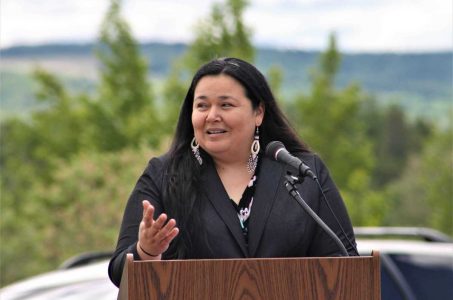Mashpee Wampanoag Tribe Hopes Congressional Committee Backs Bill That Could Lead to $1B Taunton Casino
Posted on: May 1, 2019, 07:23h.
Last updated on: May 2, 2019, 10:09h.
UPDATE: The House of Representatives Committee on Natural Resources approved legislation Wednesday that reaffirms the Mashpee Wampanoag tribal reservation by a 26-to-10 vote. It next heads to the full House.
Members of a Congressional committee have in their hands the fate of a proposal that reaffirms the regulatory status of a troubled Taunton Massachusetts reservation and may pave a path for the Mashpee Wampanoags to open a gaming venue.

Beset with internal dissension and deep deficits, the tribe is counting on the House of Representatives’ Committee on Natural Resources to approve HR 312, the Mashpee Wampanoag Tribe Reservation Reaffirmation Act.
During today’s meeting, members of Congress can vote on the proposal and offer amendments to the bill, which was introduced in January by Rep. William Keating, D-Mass.
The Mashpee Wampanoag Tribe remains the only federally recognized tribe in New England where Congress has not acted to create and protect its reservation,” Keating told Congress earlier this year.
Last month, a spokesman for the House Committee on Natural Resources said Chair Rep. Raul Manuel Grijalva, D-Arizona, does not believe the issue is about gaming, but rather about the federal government maintaining its obligations.
Tribal leaders declined to offer immediate comment on the controversy.
If approved by the committee, the legislation still needs backing by the entire House and Senate before it goes into effect.
The bill does not provide much-needed financing to build the casino. It only clears away some legal and regulatory roadblocks that make opening a venue difficult, if not impossible.
Basically, in its current form, the bill reaffirms the federal government’s initial decision in 2015 to take the tribe’s land into trust. The bill also dismisses any contrary court rulings.
Court Case
Earlier, several Taunton residents filed a lawsuit where they claimed the Department of Interior (DOI) erred in taking land into trust for the tribe. The parcels totaled 171 acres in Mashpee and 150 acres in Taunton.
In 2016, US District Court Judge William Young agreed with the residents that the DOI ignored a 2009 US Supreme Court ruling — in the Carcieri versus Salazar case — which restricts the federal government’s ability to grant land for tribes that were recognized after the Indian Reorganization Act of 1934.
Last September, the DOI eventually agreed with the court ruling, reversing its 2015 position. That decision in effect denied the tribe not only the casino but also its sovereign reservation.
In response, the tribe filed its own lawsuit against the DOI to challenge the government’s reversal.
The tribe also faces opposition from officials in nearby Rhode Island. Ocean State politicians believe the proposed casino would unfairly compete with legal gambling operations in their state.
The Mashpee Wampanoags want to open the $1 billion First Light Resort & Casino in Taunton. As envisioned, it will include a brick and mortar gaming venue — featuring 3,000 slot machines, 40 poker tables and 150 game tables. Other offerings include three hotels, entertainment spaces, restaurants, a shopping center, and a water park.
If it ever opens, the venue will also create some 2,500 jobs.
The tribe is now $500 million in debt and owes much of the money to Genting, a Malaysian-based casino operator. The company already has cut financial backing for the planned gaming venue.
As of last December, the tribe had $83,670 in its general fund. It started with the year with $6.3 million.
Recall Effort Aimed at Tribal Leaders
To further complicate matters, a recall effort was launched by tribal members earlier this year to oust tribal chairman Cedric Cromwell and vice chairwoman Jessie “Little Doe” Baird. They are accused of “malfeasance” and “wrongful acts,” according to the Cape Cod Times.
The two leaders are also accused of trying to expel council members who criticized Cromwell’s handing of finances and the apparent secrecy around casino-related expenditures.
In January, Cromwell became the focus of a no-confidence vote by the tribal council, but that vote was rescinded in February.
Looking ahead, Crowmell told Casino.org in a statement this week, “We have to have faith in this Congress to do the right thing, to take up this question of human decency and American honor, and to pass this bill to ensure that our tribe will be treated equally with other tribes and have a reservation.”
He added the tribe is confident it is “right on the legal questions.” But the process involving litigation “is very slow and very expensive. The tribe has been forced to continue to borrow money to fund its government operations, lay off employees, and cut services….”
Related News Articles
Gov. Ron DeSantis Seeks Extension in Florida Sports Betting Challenge
Most Popular
FTC: Casino Resort Fees Must Be Included in Upfront Hotel Rates
Genovese Capo Sentenced for Illegal Gambling on Long Island
NBA Referees Expose Sports Betting Abuse Following Steve Kerr Meltdown
UPDATE: Former Resorts World & MGM Grand Prez Loses Gaming License
Most Commented
-
UPDATE: Whiskey Pete’s Casino Near Las Vegas Closes
— December 20, 2024 — 30 Comments -
Caesars Virginia in Danville Now Accepting Hotel Room Reservations
— November 27, 2024 — 9 Comments -
UPDATE: Former Resorts World & MGM Grand Prez Loses Gaming License
— December 19, 2024 — 8 Comments -
FTC: Casino Resort Fees Must Be Included in Upfront Hotel Rates
— December 17, 2024 — 7 Comments
















No comments yet